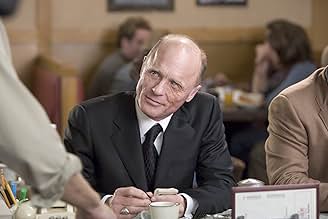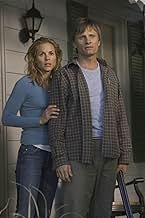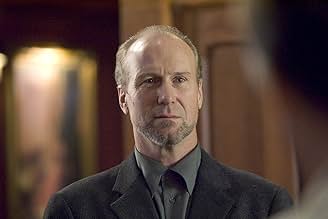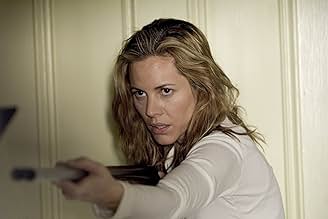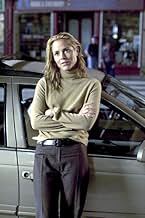Un hombre formal se convierte en héroe local con un acto de violencia que sacude a su familia con repercusiones inesperadas.Un hombre formal se convierte en héroe local con un acto de violencia que sacude a su familia con repercusiones inesperadas.Un hombre formal se convierte en héroe local con un acto de violencia que sacude a su familia con repercusiones inesperadas.
- Nominado para 2 premios Óscar
- 37 premios y 84 nominaciones en total
Argumento
¿Sabías que...?
- CuriosidadesFor the sex scene on the stairs, David Cronenberg was concerned about the two actors getting hurt on the hard wooden steps. He asked his stunt man whether or not he had any stunt pads to soften up the stairs. The stunt man laughed, saying that in the twenty years he had been working as a stunt man, no director had ever asked him for stunt pads for a sex scene. Pads were not used for most of the scene however, and in the shot when Edie is naked on the bed with bruises visible on her back, make-up was used to hide the amount of bruises that Maria Bello received from the scene.
- PifiasIn the high school softball game, the bully comes up to the plate carrying a wooden bat, but the sound heard when he hits the ball is the sound of an aluminum bat.
- Citas
[last lines]
Richie Cusack: [Joey holds a gun to Richie's head] Jesus, Joey.
Tom Stall: [as Joey shoots Richie in the head, then stands over his dead body] Jesus, Richie.
- Versiones alternativasThere are some minute differences between the US and the International version when it comes to some of the violent scenes:
- Fogarty's thug, who gets his nose smashed into his skull has more blood spurt out in the International version in the shot where he is dying on the ground.
- When Joey stomps on Richie's thug's throat, he spits blood (instead of it 'welling up') and the sound effect of the neck breaking is louder. Both shots last the same length of time and use the same take, the amount of blood was simply toned down digitally for the MPAA. Most video versions outside the U.S. use the 'international version' but the shots appear in the supplements on the U.S. DVD (In the featurette titled 'Violence's History', Cronenberg shows the U.S. and international cut scenes side by side and explains the reason why there wasn't a standard 'unrated' version in the U.S. was because the changes were so small).
- ConexionesEdited into A History of Violence: Deleted Scene - Scene 44 (2006)
Reseña destacada
In the first fifteen minutes of "A History of Violence," we get a small town diner, a baseball game, and a sneering, varsity letter-wearing high school bully. Throw in an apple pie on a window sill and some kids saying bedtime prayers, and you've got the Saturday Evening Post. But this is the work of David Cronenberg, whose films so often explore the blurry – and icky – lines between biology and technology. So it's not surprising when this film, too, heads for the gray areas, this time between the sensibilities of Rockwell and Tarantino.
Small town diner owner Tom Stalls (Viggo Mortenson) runs the kind of place where you can eat at the counter, and "see you in church" is a standard goodbye. When he single-handedly foils a robbery and saves a few lives, then, the townsfolk are impressed and grateful, but not all that surprised. Tom is a Man, after all, and that's what Men do. But as David Lynch has taught us, pastoral postcard America often conceals deep weirdness and violence. The diner incident is of course big news in Anytown, USA, and Tom finds himself attracting not only local reporters who want to know "how it felt," but also the Reservoir Dog-type Mr. Foggerty (Ed Harris), who isn't surprised that Tom knows his way around a gun, and waxes nostalgic about good times in Philadelphia involving barbed wire and a guy named Joey Cusack. Foggerty seems to think Tom knows exactly what he's talking about.
Tom as "local hero" his family can handle, but after the Foggerty matter comes to a head, they do begin to wonder where these moves that would make Jeff Speakman proud are coming from. Perhaps more unsettling is the fact that they unconsciously sort of get off on their new image of dad. Junior soon finds in himself the will to flatten his jock tormentor, and wife Edie (Maria Bello) with some gusto acts out a rough rape fantasy with her hubby. Tom Stalls, indeed, but can't prevent the inevitable truth from coming to light nor catching up with him. That's shocking enough to his family, though maybe less so than the ways that knowledge affects them.
"A History of Violence" is fond of feinting toward familiar territory, only to veer away. Just when we think we've seen if before, in "Natural Born Killers," "Cape Fear," and the "just when I think I'm out, they pull me back in" tropes of countless mob flicks, it shifts its focus. For all its brutality, it comes across as a quiet movie. There is indeed more to Tom than he lets on, but less than his detractors might believe. He may be a liar in the strictest sense, but his protestations to his family and persecutors are sincere. The contemplation of violence, both pre and post-facto, rather than the acts themselves, drive the film. Whether the capability for, and indeed commission of, such acts permanently defines a person is left for us to decide. The film ends ensconced once again in small town tranquility, though this time seething with unspoken fear, accusations, and uncertainty. "A History of Violence" doesn't force itself with preaching or moralizing, but simply unfolds. It's another solid offering from the strong career of David Cronenberg.
Small town diner owner Tom Stalls (Viggo Mortenson) runs the kind of place where you can eat at the counter, and "see you in church" is a standard goodbye. When he single-handedly foils a robbery and saves a few lives, then, the townsfolk are impressed and grateful, but not all that surprised. Tom is a Man, after all, and that's what Men do. But as David Lynch has taught us, pastoral postcard America often conceals deep weirdness and violence. The diner incident is of course big news in Anytown, USA, and Tom finds himself attracting not only local reporters who want to know "how it felt," but also the Reservoir Dog-type Mr. Foggerty (Ed Harris), who isn't surprised that Tom knows his way around a gun, and waxes nostalgic about good times in Philadelphia involving barbed wire and a guy named Joey Cusack. Foggerty seems to think Tom knows exactly what he's talking about.
Tom as "local hero" his family can handle, but after the Foggerty matter comes to a head, they do begin to wonder where these moves that would make Jeff Speakman proud are coming from. Perhaps more unsettling is the fact that they unconsciously sort of get off on their new image of dad. Junior soon finds in himself the will to flatten his jock tormentor, and wife Edie (Maria Bello) with some gusto acts out a rough rape fantasy with her hubby. Tom Stalls, indeed, but can't prevent the inevitable truth from coming to light nor catching up with him. That's shocking enough to his family, though maybe less so than the ways that knowledge affects them.
"A History of Violence" is fond of feinting toward familiar territory, only to veer away. Just when we think we've seen if before, in "Natural Born Killers," "Cape Fear," and the "just when I think I'm out, they pull me back in" tropes of countless mob flicks, it shifts its focus. For all its brutality, it comes across as a quiet movie. There is indeed more to Tom than he lets on, but less than his detractors might believe. He may be a liar in the strictest sense, but his protestations to his family and persecutors are sincere. The contemplation of violence, both pre and post-facto, rather than the acts themselves, drive the film. Whether the capability for, and indeed commission of, such acts permanently defines a person is left for us to decide. The film ends ensconced once again in small town tranquility, though this time seething with unspoken fear, accusations, and uncertainty. "A History of Violence" doesn't force itself with preaching or moralizing, but simply unfolds. It's another solid offering from the strong career of David Cronenberg.
- nowonmai42
- 29 oct 2005
- Enlace permanente
Selecciones populares
Inicia sesión para calificar y añadir a tu lista para recibir recomendaciones personalizadas
Detalles
- Fecha de lanzamiento
- Países de origen
- Sitio oficial
- Idioma
- Títulos en diferentes países
- Una història de violència
- Localizaciones del rodaje
- Empresas productoras
- Ver más compañías en los créditos en IMDbPro
Taquilla
- Presupuesto
- 32.000.000 US$ (estimación)
- Recaudación en Estados Unidos y Canadá
- 31.504.633 US$
- Fin de semana de estreno en EE. UU. y Canadá
- 364.000 US$
- 25 sept 2005
- Recaudación en todo el mundo
- 61.385.065 US$
- Duración1 hora 36 minutos
- Color
- Mezcla de sonido
- Relación de aspecto
- 1.85 : 1
Contribuir a esta página
Sugerir un cambio o añadir el contenido que falta







